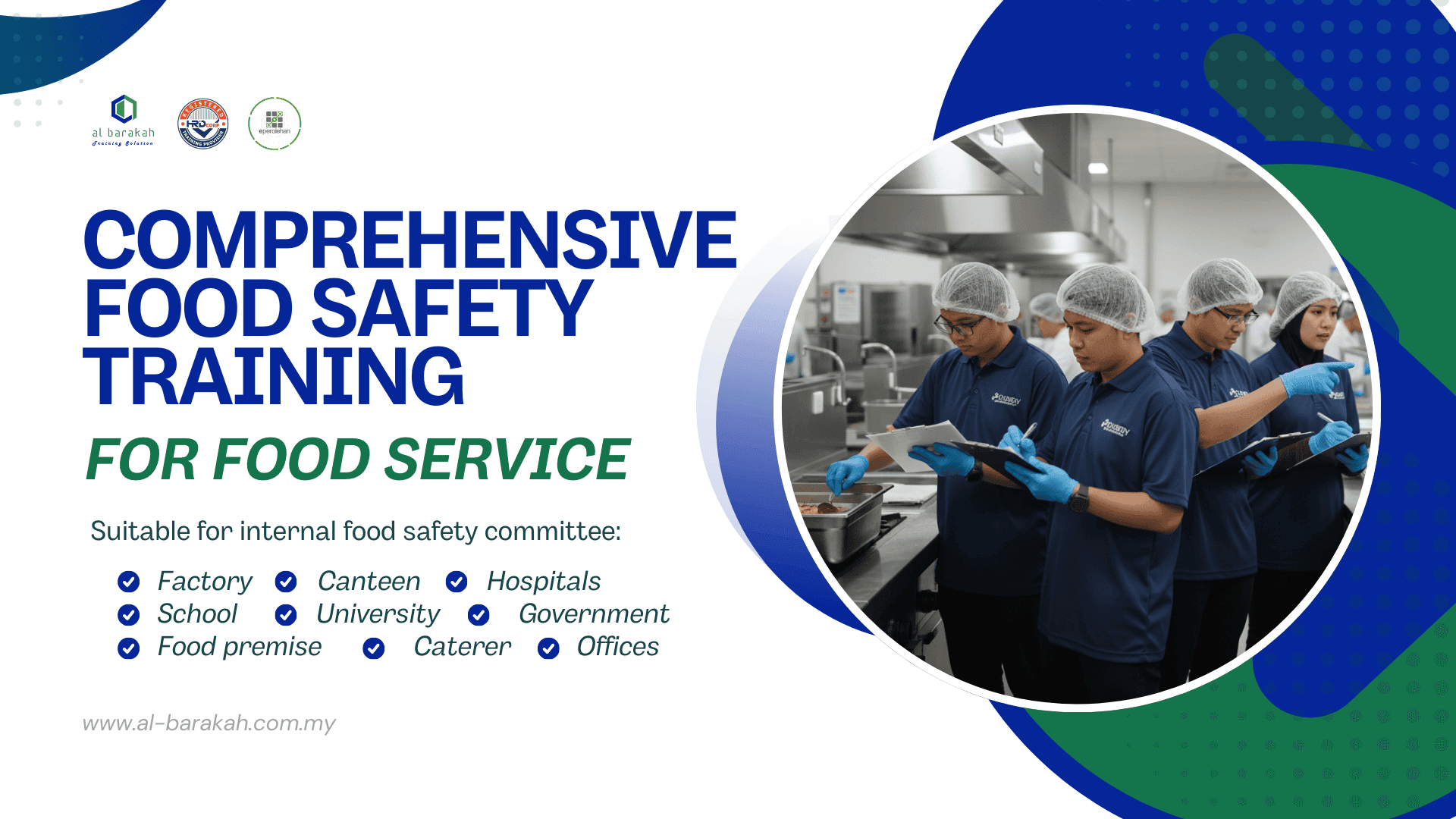Ensure Compliance & Protect Your Brand
Comprehensive food safety training for food service is a vital aspect of the food industry, designed to ensure the health and well-being of consumers while maintaining the reputation and success of food service establishments. This training equips food service professionals with the knowledge and skills needed to handle, prepare, and serve food in a safe and hygienic manner.
Food safety and hygiene are closely related to the production of quality food products in food service businesses as they help protect customers’ health, maintain a good reputation, comply with legal requirements, and prevent food waste, all of which indirectly impact the profitability of the business.
Master Food Safety to Build a Trusted Food Business
Food safety isn’t just a regulation; it’s the foundation of every successful food service operation in Malaysia. In an industry where reputation is everything, a single lapse in hygiene can lead to customer illness, legal action, and irreversible brand damage.
Our Comprehensive Food Safety Training for Food Service is a targeted, 1-day program designed to transform your team from mere food handlers into frontline guardians of public health and business integrity. This course goes beyond basic certification, delving into the why and how of internationally recognized Good Manufacturing Practices (GMP) and Good Hygiene Practices (GHP).
We equip your staff with a proactive mindset, turning food safety protocols from a checklist into a core part of your operational culture, ensuring you comply with Malaysian food safety regulations while safeguarding your customers and your bottom line.

Why This Food Safety Training is Critical for Your Business
Ignorance is not an excuse in the eyes of the law or your customers. The importance of this training is threefold:
Legal & Compliance Imperative: Meet and exceed the requirements set by Pihak Berkuasa Tempatan (PBT) and the Food Act 1983. Protect your business from fines, closures, and legal liabilities.
Brand & Reputation Protection: Prevent foodborne illness outbreaks and negative reviews that can destroy customer trust built over years.
Operational Excellence & Cost Savings: Reduce food waste through proper handling, minimize downtime from staff illness, and streamline operations with systematic cleaning, storage, and preparation protocols. This training is a direct investment in risk mitigation and profitability.
“Empowered! Our team can now confidently prevent contamination, apply GMP/GHP daily, and ensure every meal served is safe. We’ve built a stronger food safety culture from within.”
– Participants review of the Comprehensive Food Safety Training for Food Service.
Key Objectives of the Course
By the end of this comprehensive food safety training, your organization will be empowered to:
Embed a robust food safety management system mindset across all staff levels.
Identify, control, and prevent all forms of food contamination and cross-contamination.
Implement daily GMP/GHP practices within your specific food premises.
Master the safe flow of food from receiving to service, including storage, thawing, preparation, and cooking.
Foster a culture of personal accountability and hygiene among all food handlers.
- Covers Halal and the latest allergen management requirements.
Key Topics Covered
Our curriculum is meticulously designed to cover every critical aspect of food safety in a food service environment:
Introduction to Food Safety & Management Systems
Understanding Foodborne Illnesses (Bacteria, Viruses, Toxins)
Personal Hygiene for Food Handlers: The Non-Negotiables
Premises & Equipment Design and Facilities for Optimal Hygiene
Cleaning vs. Sanitizing: Master the Procedures
Contamination Control: Physical, Chemical, Biological, and Allergens
Good Food Safety Practices Across the Workflow: Receiving, Storage, Preparation, Display, Transport
Integrated Pest Management (IPM) for Food Businesses
Conducting Effective Self-Inspections & Managing Traceability (Halal & Food Safety)
Essential Documentation and Record-Keeping
Practical Benefits for Your Daily Operations
Your team won’t just learn theory; they’ll gain immediately applicable skills:
Receive Goods Correctly: Confidently inspect deliveries and reject non-conforming items.
Store Food Safely: Apply FIFO, maintain correct temperatures, and prevent spoilage.
Prevent Cross-Contamination: Set up color-coded chopping boards and tools, manage allergens.
Clean & Sanitize Effectively: Use the right chemicals, concentrations, and methods for different surfaces.
Protect Themselves and Customers: Adhere to strict personal hygiene rules, including proper handwashing and reporting illness.
Engaging & Effective Training Methodology
This is not a passive lecture. We employ an interactive, participant-centered methodology to ensure knowledge retention and practical understanding:
Expert-Led Presentations: Clear explanations of regulations and standards.
Real-World Case Studies & Scenarios: Analysis of past food safety failures and successes.
Group Discussions & Problem-Solving: Teams work through common kitchen dilemmas.
Visual Demonstrations: Videos and images of correct and incorrect practices.
Q&A Sessions: Direct interaction with our seasoned food safety consultants.
Build Your Food Safety Expertise: From Foundation to Certification
This Comprehensive Food Safety Training for Food Service is the cornerstone of all food safety knowledge. It provides the fundamental, practical skills required by every food handler. For those seeking specialized knowledge or management-level certifications, this course serves as the perfect prerequisite or complementary program.
Your Training Pathway:
| Your Current Need / Goal | Start With This Foundation: | Then Advance To These Specialized Courses: |
|---|---|---|
| Meet Basic Legal Requirements | This Course OR Basic food handler training (This course is more comprehensive; Pengendali Makanan is often the bare minimum mandate.) | — |
| Understand the Why Behind the Rules | This Course | Navigating Food Laws: Malaysia’s Food Acts and Regulations Explained (Understand the legal framework) |
| Establish Prerequisite Programs (PRPs) | This Course (Covers core GHP) | GMP Implementation Course (Deep dive into manufacturing practices) GMP Awareness Training (For all staff) |
| Implement a Food Safety Management System (FSMS) | This Course (Essential pre-requisite knowledge) | HACCP Awareness Training → HACCP Implementation Course ISO 22000 Awareness Training FSSC 22000 Awareness Training |
| Maintain & Audit Your FSMS | This Course & HACCP Implementation | HACCP Verification and Internal Auditing Training (Learn to check the system) |
| Address Specific Critical Risks | This Course (Includes allergen basics) | Food Allergen Training (Specialized, in-depth management) |
| Access Halal Market Compliance | This Course (Core hygiene is a fundamental Halal requirement) | Halal Awareness Training (Learn specific standards and protocols) |
In simpler terms:
This course teaches your team HOW to do things safely (the practices).
The other courses teach you how to MANAGE, DOCUMENT, and AUDIT those practices systematically (the systems), or how to comply with specific standards (Halal, ISO).
Explore our full suite of Food Safety & Quality Courses
Ready to Build Your Food Safety Culture?
Protect your customers, your team, and your reputation with certified, practical training delivered directly at your premises.
By implementing proper food safety and hygiene practices, businesses can ensure that their products are consistent, have a longer shelf life, comply with regulations, result in fewer customer complaints, and can be traced to their origin. This training is essential for reducing the risk of illness and protecting employees, consumers, and your business.
Click Here to Inquire Now or email us directly at sa***@************om.my to schedule your in-house training session.











































